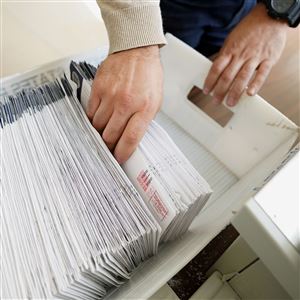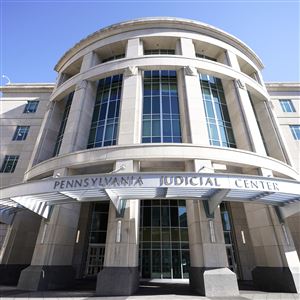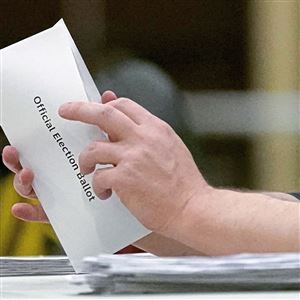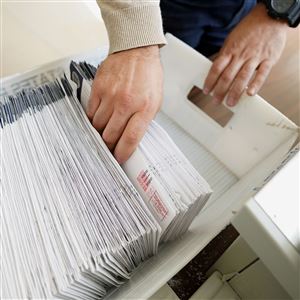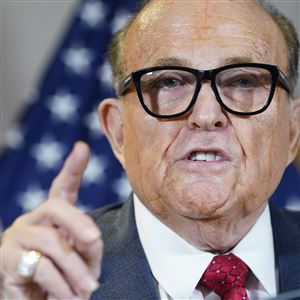HARRISBURG — The Pennsylvania Supreme Court on Tuesday upheld the state’s mail-in voting law, after a state appellate court declared it unconstitutional.
The state’s highest court upheld Act 77 of 2019, deeming the now-controversial law as constitutional. GOP House members who were part of the lawsuit will appeal the ruling to the U.S. Supreme Court, one member said Tuesday.
Act 77 of 2019 expanded the state’s mail-in voting law by creating a no-excuse mail voting option. In 2019, the law’s passage was widely lauded by Republicans and Democrats as the most significant update to the state’s election code in more than 80 years. It passed the 253-member General Assembly with nearly unanimous and bipartisan support.
Pennsylvania’s mail-in voting law has come under scrutiny by Republicans due to former President Donald Trump casting doubt on the safety and security of mail voting during the 2020 election.
In the years since the vote-by-mail expansion went into effect, millions of Pennsylvania voters have chosen to cast their votes by mail — especially during the first year of the COVID-19 pandemic.
The state Supreme Court on Tuesday again upheld the mail-voting law in a 5-2 decision, with Justices Kevin Brobson and Sallie Updyke Mundy dissenting. The majority opinion said they found “no restriction in our Constitution on the General Assembly’s ability to create universal mail-in voting,” according to the ruling authored by Justice Christine Donohue.
A Bradford County commissioner filed the suit against the Department of State in July 2021, arguing that the state’s mail-in voting law violated the state’s constitution and required a constitutional amendment to allow for the practice. Fourteen House Republicans joined the suit, including Western Pennsylvania Reps. Tim Bonner, R-Grove City; Aaron Bernstine, R-Ellwood City; Bob Broos, R-Murrysville; and Bud Cook, R-Belle Vernon.
Mr. Bonner said Tuesday that this was the expected decision, and he hopes the U.S. Supreme Court will consider the issue. In the meantime, Mr. Bonner said he thinks voters should choose whether mail voting is allowed in the state through a ballot question.
“Really, the people should have the opportunity to decide what type of election system they have,” Mr. Bonner added.
Mr. Bonner is a freshman lawmaker, who was not in office when the 2019 law was approved. Since taking office in 2020, however, he’s been a vocal opponent of the law. He and the group of 13 Republicans filed a separate suit asking the court to throw out the mail-voting law based on a provision that says the law is void when any part of the law is struck down in court. The U.S. Third Circuit Court of Appeals ruled in May that the state’s mail ballot requirement to have a handwritten date on the outside envelope was not necessary.
In the majority opinion, the state Supreme Court justices ruled that the state constitution does not require a person to cast their ballot in person.
Gov. Tom Wolf said in a statement that Tuesday’s ruling “assures that mail-in voting remains in place.”
“Voting is a fundamental right — a right that we should ensure is accessible for all voters,” Mr. Wolf said. “Mail-in voting is a safe, secure and legal option for Pennsylvania voters to exercise that right. I will continue to advocate for voting reforms that remove barriers and increase access to voting.”
Justice Brobson, who was elected to the state’s highest court last year, argued in his dissenting opinion that the state Supreme Court “overrules 160 years of this Court’s precedent to save a law that is not yet 3 years old.”
Justice Mundy, in her dissenting opinion, said her argument does not comment on whether mail-in voting is “wise public policy” and notes that her role is to interpret the state constitution. After doing so, she wrote that she believes the state constitution needs to be amended before mail-in voting is allowed.
In a concurring opinion, Justice David Wecht likened the state constitution’s language around voting by mail to a neighbor caring for a dog while their owner is out of town. “[The owner] instructs the neighbor that he ‘shall’ give Fido one cup of kibble in his bowl, fresh water, and a walk around the block,” Justice Wecht wrote. “No reasonable interpretation of those requirements necessarily prohibits the neighbor from also playing fetch with Fido, or rubbing his belly, or giving him a treat.”
This example illustrates the state constitution’s language around mail voting: it sets a floor, but not a ceiling, for how votes should be cast, Justice Wecht argued.
Rep. Seth Grove, R-York, who chairs the House State Government committee tasked with managing the state’s election laws, criticized the liberal-leaning justices for this ruling and past ones. Republicans have frequently criticized the state’s highest court for overreaching and making decisions based on their political beliefs.
“While some may celebrate this ruling and others denounce it, the reality is we still have election laws and processes that are failing our voters and election administrators,” Mr. Grove added. “Until we update our voting laws, Pennsylvania will continue to have chaos in our elections.”
Gillian McGoldrick: gmcgoldrick@post-gazette.com or on Twitter @gill_mcgoldrick
First Published: August 2, 2022, 5:26 p.m.
Updated: August 2, 2022, 6:55 p.m.







